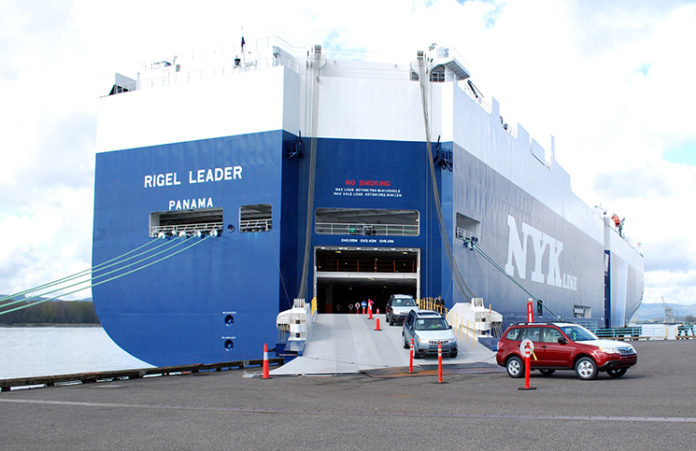
If international trade is the blood flow of the global economy, then President Trump’s expanding trade war with China, Mexico, Canada and the European Union is likely to create some dangerous clots – including some that filter down to the Clark County level.
The Port of Vancouver USA, already dealing with fluctuating trade arguments between the Trump Administration and China, is anticipating more uncertainty in the steel and aluminum markets as Trump has expanded his trade war rumblings to the United States’ traditional partners of Mexico, Canada and the European Union. Tariff retaliations by those countries, many of which are aimed at Midwestern agriculture, are also likely to impact the port, as it ships a significant amount of soy and other grain products overseas.
“When this started out, it was going to be proposed that Europe and Canada were going to be exempt,” said Heinz Lange, the port’s sales director. “What worries me is us going into a broader trade war. And we’re seeing countries retaliating.”
What concerns Lange the most is that more countries will have quotas on how much steel or aluminum they can sell to the United States. Currently, Australia is the only country that doesn’t have tariffs on the two materials. South Korea, another country that ships through the port occasionally, is under quotas that limit the amount of steel and aluminum it can ship. Lange fears that quota system will spread to more countries and possible trading partners.
“We don’t bring any steel in really from China anymore,” Lange said. “And we are expecting more quotas. I think that may be the next level the Trump Administration tries with this.”
As steel and aluminum become more expensive – with 25 percent tariffs on steel and 10 percent on aluminum imports – those costs are likely to be passed down to consumers, increasing the prices of consumer goods.
“Currently the market is absorbing those rates,” Lange said. “The price of domestic steel is up about 40 percent. It’s basically a supply-and-demand situation, but we still have a robust economy holding things together.”
Adding Mexico and Canada to the steel and aluminum trade war should have significant impacts on the auto industry. Cars made in the United States actually often travel back and forth between the three countries as different parts are added. Slapping tariffs on that process is likely to cause car prices to rise, Lange said.
“It will all reflect back into the end consumer price,” he said.
Those rising prices and scarcer materials could also bode poorly for American workers, said Alex Strogen, the port’s chief commercial officer.
“When we were in Asia and I was talking to a former colleague, he made the comment that tariffs coming in is like a tax on your people,” Strogen said. “Tariffs on other countries, on the other hand, is a job killer. That may be a bit simplistic, but it makes sense.”
The agricultural market is also seeing more uncertainty. China usually buys a significant amount of grain and especially soy from the United States. But it has shifted that purchasing to other countries, including Brazil, after the trade war started.
“Soybeans in China is one commodity we’ve seen an impact on,” Strogen said. “It’s been somewhat muted, but it’s noticeable.”
The Port of Vancouver is part of the chain that ships grains and soy overseas, and farmers and companies that sell grain are having to look for new trading partners in other countries as the trade war continues.
“What worries me more is now we’re becoming a protectionist country, and the Trump administration is trying to pick economic winners and losers,” Lange said.
Washington’s apple growing industry also took a significant hit when Mexico retaliated with higher tariffs on apples. The country is that industry’s biggest buyer, and now apple growers will have to find markets in other countries to make up the difference.
“In the end I think they’ll find buyers,” Strogen said. “But we find there’s a fair amount of agricultural product in storage across the United States right now. There’s a large volume for sale – if you’re interested.”
The original purpose of the trade war was to stop China from illegally dumping steel on the American market – along with markets in several other countries – flooding it with cheap product that hurt American industry. But prior to the sanctions the United States also imposed high duties on China because of its dumping policy.
“In some respects I agree (with the U.S. standing up against China on steel and aluminum),” Lange said. “China did a lot of aluminum and steel dumping on the global market. But the response to that should be global.”
But Trump’s fluctuating policies and trade fights with traditional allies are making the picture far more complicated than that.
“The challenge is to predict what President Trump will do,” Lange said. “The only thing that’s predictable is he’ll be unpredictable. But the rhyme and reason doesn’t seem to be there.”
The Trump administration is instigating the trade war under World Trade Organization rules, using an exemption for national security as a way to raise tariffs.
“I think Trump and (Commerce Secretary) Wilbur Ross are using that as their loophole,” Lange said. “Everybody’s trying to learn the strategy or what this actually is. I’ve heard this is a tactic he employs: Go to an unreasonable high and then talk things down. Hopefully it’s a short term thing, but there’s no rhyme or reason to it.”






